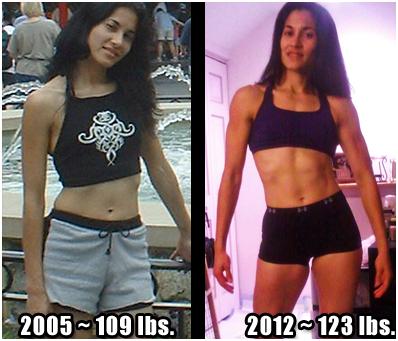There is an obsession with the number on the scale and people weigh in a lot in one day; when they wake up, before working out, after running, after a fitness class, after weight training, before they eat, after they eat, before going to bed. The most common one I see is people weigh in before and after working out and having a disappointed look. Are they expecting a big number after one workout that was probably an hour or less?
“In the Middle Ages, they had guillotines, stretch racks, whips and chains. Nowadays, we have a much more effective torture device called the bathroom scale.” ~Stephen Phillips
This used to be me years ago, when I was over exercising, not eating enough and preoccupy with reaching 100 lbs. or less (my lowest weight = 109 lbs.; too low for me). It took time for me to see the big picture and understand my body and how it works. Taken from my experience plus studying the subject, I decided to make a list of why you shouldn’t weigh yourself every single day and why you should stop obsessing with this piece of equipment.
1. The number you see on the scale doesn’t tell you the whole story. How much of that number is muscle, bones, organs, water, body fat, the food that you’ve eaten during the day?
2. Your weight fluctuates daily after you drink water, after you eat (even healthy foods like broccoli, banana, whole wheat bread can cause you to feel bloated for a while), after using certain medications, after you work out, during your menstrual cycle (ladies), etc.
3. During your workouts, you usually sweat a lot and you need to replenish these fluids drinking water during your session; this is another reason why you see a different number after your daily workout routine.
4. If you’ve been lifting weights for a while then you are probably gaining muscle, which occupies less space than its equivalent weight in fat. Lean muscle looks better on your body, even if you don’t see a major change on the scale.
5. Some people let this piece of equipment determine their mood for the rest of the day and it can cause stress which is never good for your body. Don’t let this number define you… You are much more than just a number.
6. Post Workout Swelling: During your strength training session, your muscles fibers are tearing up (with proper nutrition, hydration and rest your body rebuilds them for a stronger you). After an intense workout, your blood rushes to the affected muscles to provide them with proper nutrients to recover and clear lactic acid. This is that “pump” effect you feel when you just finished weight lifting because your muscles are inflamed and this is temporary.
7. The scale doesn’t measure the changes in your health. Focus on other benefits you are getting with your new active lifestyle like…
•You feel more energy.
•Your resting heart rate lowers.
•Bone Density Improves.
•Blood pressure and cholesterol levels improve.
•You sleep better.
•Clothes are fitting better.
•Losing inches.
•You can lift more weight (stronger).
•Your range of motion increases (flexibility).
•You can run more without stopping to walk.
•Excellent yearly checkups with your doctor.
OK! Now here are better ways to measure progress:
•Take girth measurements (arms, waist, hips, and thighs).
•Take progress picture every month and compare.
•Do a body fat analysis.
•How your clothes are fitting.
•Keep a fitness journal and write your routine (exercise, sets, reps, weight, how fast you ran one mile, how many minutes more you are spending using the Stairmaster, even write how are you feeling).
•And if you are going to use the scale, use it once a week or every other week. Do it first thing in the morning before eating or drinking and use minimal clothing every time. And don’t do it again for the rest of the day (Max fat loss in one week = 2 lbs).
Changing your eating habits by eating clean, all natural, moderate meals every 3-4 hours, drinking enough water, keeping an active lifestyle with strength training and moderate cardio exercise and giving your body a well-deserved rest is a more productive way to getting a strong and healthier version of yourself. This is much better than stressing over achieving and unhealthy low number on the scale.
What do you think? Leave your questions and comments in the box below.


